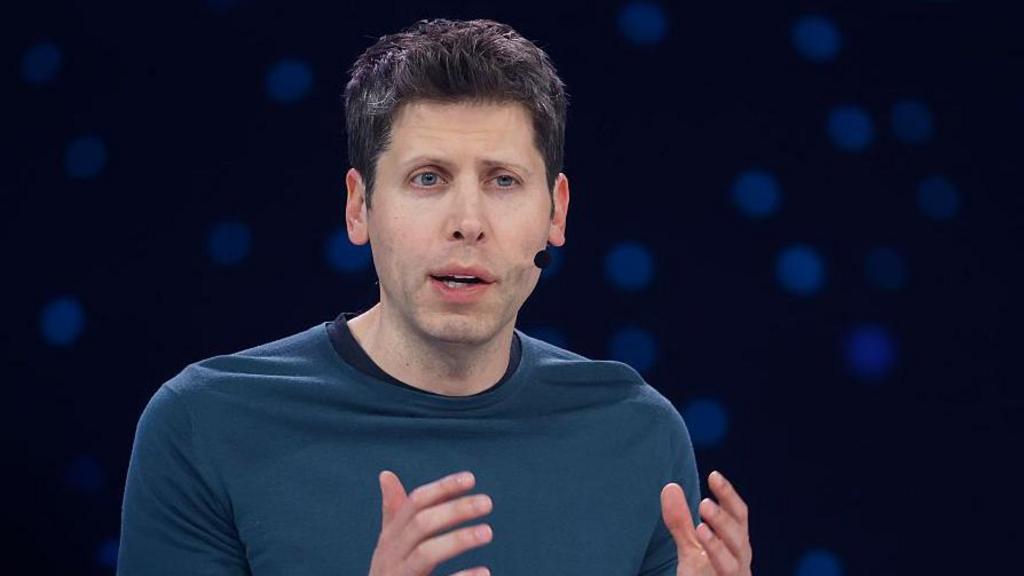OpenAI, the creator of ChatGPT, has introduced GPT-5, the latest iteration of its AI chatbot, touting its ability to deliver expertise at the PhD level.
Described as “smarter, faster, and more useful,” OpenAI co-founder and CEO Sam Altman hailed the new model as the dawn of a new era for ChatGPT.
“I think having something like GPT-5 would be pretty much unimaginable at any previous time in human history,” he stated ahead of Thursday’s launch.
The release of GPT-5, with its purported “PhD-level” capabilities in areas such as coding and writing, arrives as tech companies continue to compete for the most advanced AI chatbot.
Elon Musk recently made similar assertions regarding his own AI chatbot, Grok, which has been integrated into X (formerly Twitter).
During the launch of Grok’s latest version last month, Musk claimed it was “better than PhD level in everything” and proclaimed it the world’s “smartest AI”.
Altman indicated that OpenAI’s new model would exhibit fewer hallucinations – the phenomenon where large language models fabricate answers – and be less prone to deception.
OpenAI is also positioning GPT-5 as a proficient assistant for coders, aligning with a trend among major American AI developers, including Anthropic, whose Claude Code targets the same market.
OpenAI has emphasized GPT-5’s capacity to create entire software programs and demonstrate enhanced reasoning skills, providing answers that showcase the underlying logic and inference.
The company asserts that it has trained the model to be more honest, provide users with more accurate responses, and offer an overall more human-like experience.
According to Altman, the model represents a “significantly better” iteration compared to its predecessors.
“GPT-3 sort of felt to me like talking to a high school student… 4 felt like you’re kind of talking to a college student,” he said in a briefing prior to Thursday’s launch.
“GPT-5 is the first time that it really feels like talking to an expert in any topic, like a PhD-level expert.”
However, Prof Carissa Véliz of the Institute for Ethics in AI suggests that the launch of GPT-5 may not be as groundbreaking as its marketing implies.
“These systems, as impressive as they are, haven’t been able to be really profitable,” she stated, also noting their limitations in truly emulating human reasoning abilities, instead merely mimicking them.
“There is a fear that we need to keep up the hype, or else the bubble might burst, and so it might be that it’s mostly marketing.”
One ethics expert noted that the launch of GPT-5 underscores the widening gap between AI’s capabilities and our capacity to govern it in accordance with public expectations.
“As these models become more capable, the need for comprehensive regulation becomes even more urgent,” stated Gaia Marcus, Director of the Ada Lovelace Institute.
The BBC’s AI Correspondent Marc Cieslak was granted exclusive access to GPT-5 before its official launch.
“Apart from minor cosmetic differences the experience was similar to using the older chatbot: give it tasks or ask it questions by typing a text prompt.
It’s now powered by what’s called a reasoning model which essentially means it thinks harder about solving problems, but this seems more like an evolution than revolution for the tech.”
The rollout of GPT-5 also has implications for commercial enterprises concerned about the use of their content.
“As AI content becomes more convincing, we need to ask ourselves – are we protecting the people and creativity behind what we see every day?”, said Grant Farhall, chief product officer at Getty Images. “Authenticity matters – but it doesn’t come for free.”
Farhall emphasized the importance of scrutinizing how AI models are trained and ensuring that creators are compensated if their work is utilized.
The company will make the model available to all users starting Thursday.
In the coming days it will become a lot clearer whether it really is as good as Sam Altman claims it is.
Anthropic recently revoked OpenAI’s access to its application programming interface (API), alleging that OpenAI was violating its terms of service by utilizing its coding tools ahead of GPT-5’s launch.
An OpenAI spokesperson stated that it was “industry standard” to evaluate other AI systems to assess their own progress and safety.
“While we respect Anthropic’s decision to cut off our API access, it’s disappointing considering our API remains available to them,” they added.
With a free tier for its new model, the company may be signalling a potential move away from the proprietary models that have previously dominated its offerings.
On Monday, OpenAI revealed it was making changes to promote a healthier relationship between users and ChatGPT.
In a blog post, it said: “AI can feel more responsive and personal than prior technologies, especially for vulnerable individuals experiencing mental or emotional distress.”
It said it would not give a definitive answer to questions such as, “Should I break up with my boyfriend?”
Instead, it would “help you think it through – asking questions, weighing pros and cons”, according to the blog post.
In May, OpenAI pulled a heavily-criticised update which made ChatGPT “overly flattering”, according to Sam Altman.
On a recent episode of OpenAI’s own podcast, Mr Altman said he was thinking about how people interact with his products.
“This is not all going to be good, there will still be problems,” he said.
“People will develop these somewhat problematic, or maybe very problematic, parasocial relationships [with AI]. Society will have to figure out new guardrails. But the upsides will be tremendous.”
Mr Altman is known to be a fan of the 2013 film Her, where a man develops a relationship with an AI companion.
In 2024, actress Scarlett Johansson, who voiced the AI companion in the film, said she was left “shocked” and “angered” after OpenAI launched a chatbot with an “eerily similar” voice to her own.
Sign up for our Tech Decoded newsletter to follow the world’s top tech stories and trends. Outside the UK? Sign up here.

